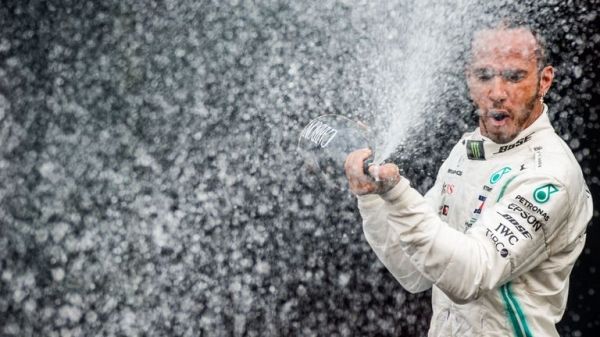Formula One: Lewis Hamilton very likely to become motor racing’s greatest champion
The F1 star goes his own way, confident in his own skin as much as in his own ability, ignoring what public opinion might dictate.

Rarely can such an extraordinary sporting triumph have been so comprehensively eclipsed in the headlines.
Rugby has been the word of the week. Alright, along with Brexit, and election.
So Lewis Hamilton’s sixth world Formula One title – a car racing certainty to be confirmed at this weekend’s US Grand Prix – has crept along almost unnoticed.
Do his exploits deserve more plaudits than they get? Yes.
Does he care? Not massively.

Hamilton goes his own way, confident in his own skin as much as in his own ability, ignoring what convention or public opinion might dictate.
While other drivers took to the heat chambers to prepare for the rigours of last year’s Singapore Grand Prix, Hamilton flew 25,000 miles in 10 days, attending fashion shows in Shanghai and New York, and went to a friend’s wedding.
He won the race.
And has he not earned the right to do things his way?
The boy from a Stevenage council estate was competing in karting at eight, and racially abused on the track from those early days, according to his Mercedes team boss Toto Wolff.
“If, as a child, you have had to overcome abuse and discrimination,” said Wolff before last week’s Mexico Grand Prix, “on one side it makes you a stronger personality but on the other side it also leaves scars.”

Strong he certainly is. And the boy wonder is now 34. But still hungry. Still a racer.
Only Michael Schumacher (seven) has more world titles.
The German was – and remains – a national hero.
But he suffered at times – as Hamilton certainly does – from the predictability problem.
There might be the odd bump along the way, but we know who’s going to win. Especially in motor racing, where the car is a major determining factor.
Mercedes are dominant, clinching a sixth successive constructors’ title weeks ago with four races still remaining.
Sport as entertainment relies on its excitement, its uncertainty.
It needs a battle and a narrative.
Formula One is currently lacking in all those qualities.

When Pete Sampras was racking up a (then) record-breaking seven Wimbledon titles, his was a mostly unloved mastery among a public craving a contest.
Steffi Graf and Martina Navratilova suffered similarly.
All three became hugely more popular and appreciated in their latter playing years and in retirement.
It is easy to imagine the same happening to Hamilton, not least because of radical rule changes announced this week to make overtaking easier from 2021.
It promises more exciting racing, and a challenge the Briton intends to take up. “I don’t think I’ve hit my peak yet,” he said in Texas this week. “I plan to continue to get stronger.”

Hamilton – the future Sir Lewis? – is very likely to become motor racing’s greatest champion. Certainly statistically. Comparisons with different eras are bedevilled by unanswerable questions.
But he has a proper sense of his sport’s history, for the achievements of Juan Manuel Fangio and Emerson Fittipaldi, Britons like Damon Hill and James Hunt and Sir Jackie Stewart – Ayrton Senna and Michael Schumacher before fate intervened.
He belongs in that company, and may yet carve out a place on the very top of the pile. And be properly appreciated for it.
Previous article
Sunday’s national newspaper front pages
Next article
Vietnamese government ‘saddened’ over Essex lorry deaths
